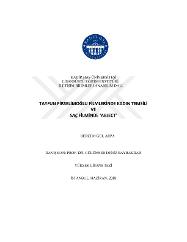| dc.contributor.advisor | Bayraktar, Gülümser Deniz | en_US |
| dc.contributor.author | Arpa, Berçem Gül | |
| dc.date.accessioned | 2020-02-16T14:29:21Z | |
| dc.date.available | 2020-02-16T14:29:21Z | |
| dc.date.issued | 2019 | |
| dc.identifier.uri | https://hdl.handle.net/20.500.12469/2742 | |
| dc.description.abstract | Tayfun Pirselimoğlu, Yeni Türkiye Sineması'nda yer alan bir yönetmendir. Yeni Türkiye Sineması'nın ilgilendiği en önemli alanlardan biri de kadın temsilleridir. Tayfun Pirselimoğlu da filmlerinde kadını toplumda bastırılan, dışlanan ve yok sayılan bir kesim olarak temsil eder. Tayfun Pirselimoğlu'nun ölüm ve vicdan üçlemesi olan Rıza (2007), Pus (2009), Saç (2010) ile Ben O Değilim (2014) filmlerindeki kadın karakterler ataerkil düzende varlıklarını sürdürmeye çalışırlar. Kadının toplumsal konumu ve rolleri Tayfun Pirselimoğlu'nun filmlerinde toplumun bakışını eleştirir. Bu çalışmada dışlanma ve bastırmayla ilgili olan Julia Kristeva'nın 'abject' kavramı üzerinden Saç filmi değerlendirilecektir. 'Abject' arada kalan, özneye sınırlarını hatırlatan bir kavramdır. Saç filminin 'abject' ile ortak noktaları; bedenin atığı olan saç, hastalık ve cesettir. Saç filmindeki karakterler anne-baba-çocuk olarak oedipal üçgenle özdeşleşmektedir. | en_US |
| dc.description.abstract | Tayfun Pirselimoğlu is a director of the New Turkish Cinema movement. One of the
most important issues in New Turkish Cinema Wave is the representation of women
in film. Tayfun Pirselimoğlu, represents women as repressed, excluded and ignored
figures in his films. This perspective belongs to society. The female characters in the
movies; Rıza (2007), Pus(2009), Saç(2010) and also Ben O Değilim (2014) of Tayfun
Pirselimoğlu’s death and conscience triology, are in a struggle for pursuing their
existence in the patriarchal order. Women's social position and roles criticize society's
view in these films. In this study, Hair will be evaluated through the abject concept of
Julia Kristeva, which is related to exclusion and suppression. Abject is a term which
is used to define the status of being neither subject or object, it is a thing that reminds
subject its boundaries. Especially the movie Saç, shares a common ground with abject
in the sense of hair as a waste of body, disease and corpse. Characters in the film are
identified with the oedipal triange of parents and children. | en_US |
| dc.language.iso | tur | en_US |
| dc.publisher | Kadir Has Üniversitesi | en_US |
| dc.rights | info:eu-repo/semantics/openAccess | en_US |
| dc.subject | Tayfun Pirselimoğlu | en_US |
| dc.subject | Yeni Türkiye Sineması | en_US |
| dc.subject | kadın temsili | en_US |
| dc.subject | abject | en_US |
| dc.subject | Tayfun Pirselimoğlu | en_US |
| dc.subject | New Turkey’s Cinema | en_US |
| dc.subject | woman representation | en_US |
| dc.subject | abject | en_US |
| dc.title | Tayfun Pirselimoğlu filmlerinde kadın temsili ve Saç filminde abject | en_US |
| dc.type | masterThesis | en_US |
| dc.department | Enstitüler, Lisansüstü Eğitim Enstitüsü, İletişim Bilimleri Ana Bilim Dalı | en_US |
| dc.relation.publicationcategory | Tez | en_US |
| dc.identifier.yoktezid | 548785 | en_US |
















